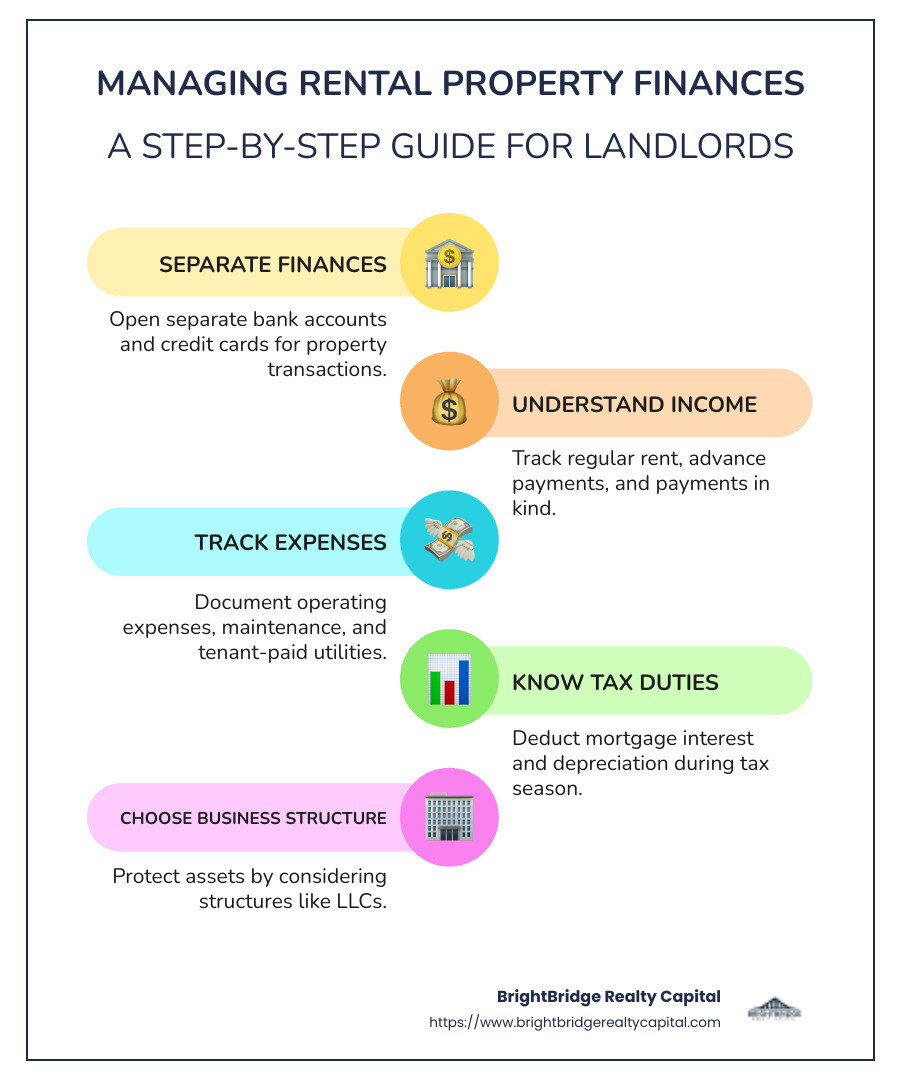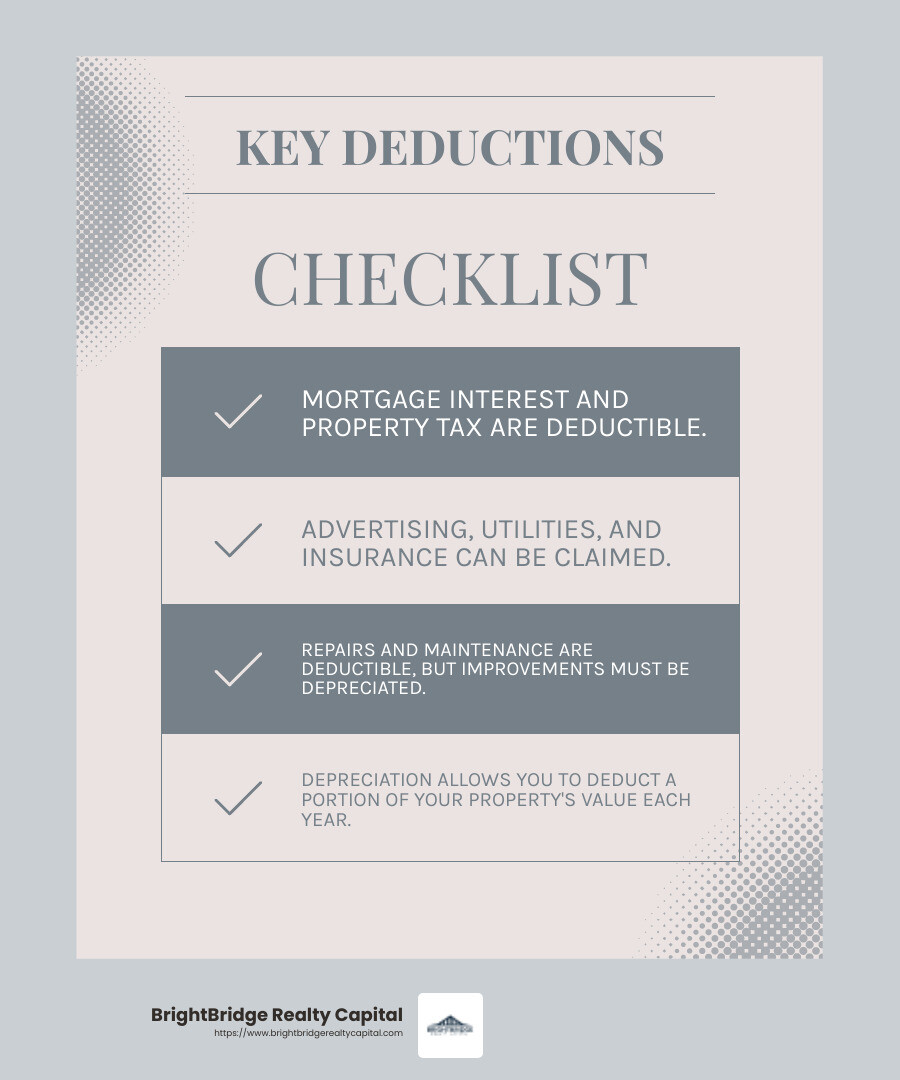The Landlord's Guide to Managing Rental Property Finances

How to manage rental property finances can seem daunting, but having a clear plan is key to ensuring success as a landlord. Here’s a quick guide to get you started:
- Keep Business and Personal Finances Separate: Open separate bank accounts and credit cards.
- Understand Your Rental Income: This includes regular rent, advance payments, and payments in kind.
- Keep Track of Expenses: Record operating expenses, maintenance, and any tenant-paid utilities.
- Know Your Tax Responsibilities: Ensure you’re aware of what's deductible, like mortgage interest and depreciation.
- Choose the Right Business Structure: Protect your personal assets by considering entities like LLCs.
The excitement of generating rental income also comes with significant tax responsibilities. As Andrew Pierce, founder of a real estate holding company, says, "A business is a business." When you become a landlord, you're essentially running your own business. Not only do you need to track every dollar you earn from rentals, but you also need to be savvy about the expenses you can deduct when tax season comes around.
With the right strategies, managing rental property finances doesn’t have to be overwhelming. Whether you're a seasoned investor or just starting, knowing how to handle income, expenses, and taxes will help keep your business thriving.

Simple how to manage rental property finances word guide:
- rental property financial model
- how to finance your first rental property
- ways to finance a rental property
Understanding Rental Income and Expenses
Managing rental property finances begins with a clear understanding of rental income and expenses. Let's break it down.
What Counts as Rental Income?
Rental income isn't just the monthly check from your tenant. It includes:
- Regular Rent Payments: This is the standard monthly payment you receive.
- Advance Rent: Any rent you receive before the period it covers. For example, if a tenant pays for the last month of a lease upfront, it counts as income in the year received.
- Security Deposits: If you keep any part of a security deposit due to a tenant not fulfilling lease terms, it becomes rental income.
- Payments for Canceling a Lease: If a tenant pays you to end a lease early, this amount is considered rental income.
- Tenant-Paid Expenses: If a tenant pays an expense that you are responsible for, like utilities, it should be included in your income.

Deductions You Can Claim
The good news is that there are many deductions you can claim to reduce your taxable income. These include:
- Mortgage Interest and Property Tax: Significant deductions for most landlords.
- Operating Expenses: Costs like advertising, utilities, and insurance.
- Repairs and Maintenance: Expenses that keep your property in good condition. Improvements which increase the property's value must be depreciated over time.
- Depreciation: You can deduct a portion of your property's value each year.

Tax Reporting Basics
Tax reporting for rental properties involves detailed record-keeping and accurate reporting of income and expenses. Here’s what you need to know:
- Use Schedule E: This is where you'll report your rental income and expenses on your Form 1040.
- Track Every Dollar: Keep receipts, invoices, and any documents that support your income and expenses.
- Understand Passive Activity Loss Rules: Losses from rental properties may be limited by these rules. Forms like 8582 can help determine any limitations.
Keeping good records is essential. They not only help you prepare your tax returns but also support your claims if you're ever audited.
By understanding the full scope of rental income and the deductions available to you, you can effectively manage your rental property finances and make the most of your investment. This knowledge sets the stage for maximizing tax benefits, which we’ll explore next.
How to Manage Rental Property Finances
Managing rental property finances might seem daunting, but it boils down to three main components: record-keeping, using accounting apps, and smart banking strategies. Let's explore each to make financial management a breeze.
Record-Keeping Essentials
Keeping accurate records is the backbone of managing rental property finances. Here’s how to make it simple:
Digitize Receipts: Forget the shoebox full of paper. Use apps to scan and store receipts digitally. This makes accessing and organizing records a snap.
Organize Financial Tracking: Use systems like Stessa to monitor your property's performance. It helps you track income, expenses, and even provides tax-ready documentation.
Keep All Documents: Digitize notices, bills, and any other paperwork. This ensures you have everything you need for tax time or audits.
Best Accounting Apps for Landlords
The right tools can make managing your finances much easier. Here are some top accounting apps for landlords:
Stessa: Created by real estate investors, it offers a free and comprehensive way to track property performance and financials. It's perfect for keeping everything in one place.
QuickBooks: A versatile accounting app that’s great for all types of businesses. It helps you manage income, expenses, and even payroll if you have employees.
Appfolio: This is ideal for landlords with larger portfolios. It offers property management and accounting features in one robust platform.
Buildium: Similar to Appfolio, Buildium is excellent for managing multiple properties. It offers accounting, leasing, and operational features.
Banking Strategies for Real Estate Investors
Smart banking can simplify your financial management and protect your investments:
Separate Accounts: Open separate bank accounts for your rental properties. This helps keep personal and business finances distinct, making tracking and reporting easier.
Consider an LLC: Setting up an LLC can provide liability protection and may offer tax benefits. Consult with a professional to see if it’s right for you.
Work with Brokers: Real estate brokers can offer advice on financing and investment strategies, helping you make informed decisions.
By following these strategies, you can effectively manage your rental property finances, keeping everything organized and maximizing your returns. Next, let's explore how to maximize tax benefits from your rental properties.
Maximizing Tax Benefits
Navigating rental property taxes can seem tricky. But with a few key strategies, you can maximize your tax benefits and keep more of your hard-earned money.
Deductions: Your Best Friend
Deductions are a powerful way to reduce your taxable income. As a landlord, you can deduct many expenses related to your rental property. Here's what you should know:
Mortgage Interest and Property Taxes: These are two of the biggest deductions you can claim. They can significantly lower your taxable income.
Operating Expenses: This includes everything from repairs and maintenance to utilities and insurance. Keep detailed records of these expenses to ensure you can claim them at tax time.
Professional Fees: If you hire a property manager or accountant, those fees are deductible too.
Depreciation: A Hidden Gem
Depreciation allows you to spread the cost of your property over several years, reducing your taxable income annually. Here's how it works:
Residential Rental Property: Typically, you can depreciate a residential property over 27.5 years. This means you take a portion of the property's value as a deduction each year.
Improvements: Major improvements, like a new roof or kitchen renovation, can also be depreciated. Keep track of these investments, as they can add up over time.
Tax Reporting: Stay Compliant
Proper tax reporting is crucial to avoid penalties and make the most of your deductions:
Report All Income: Ensure you report all rental income, including any payments for services or advance rent. This keeps you in line with IRS requirements.
Use the Right Forms: Most landlords will use Schedule E (Form 1040) to report rental income and expenses. Make sure to fill it out accurately to reflect your financial activities.
Keep Meticulous Records: Good record-keeping supports your deductions and depreciation claims. Use apps like Stessa to keep everything organized and accessible.
By understanding and utilizing deductions, depreciation, and accurate tax reporting, you can effectively manage your rental property finances and maximize your tax benefits. Up next, we'll tackle some frequently asked questions about rental property finances.
Frequently Asked Questions about Rental Property Finances
Are utilities tax deductible on rental property?
Yes, utilities can be tax deductible for landlords. If you pay for utilities like water, electricity, or gas for your rental property, you can deduct these expenses from your rental income. It's important to keep detailed records of all utility bills to ensure you can claim them accurately at tax time. If your tenant pays for utilities, you cannot deduct those costs.
Can I write off tools for rental property?
Absolutely! Tools that you purchase specifically for maintaining or repairing your rental property can be written off as a business expense. This includes everything from hammers and wrenches to more expensive equipment like power tools. Keep receipts and records of these purchases. These expenses can be deducted as part of your operating expenses, which helps reduce your taxable rental income.
How to maximize tax return on rental property?
Maximizing your tax return on a rental property involves careful planning and record-keeping. Here are some tips to help you get the most out of your tax return:
Take Advantage of Deductions: Ensure you claim all eligible deductions, such as mortgage interest, property taxes, insurance, repairs, and professional fees.
Depreciation: Don't forget to claim depreciation on your property and any significant improvements. This can substantially lower your taxable income.
Track Every Expense: Use financial tracking apps like Stessa to digitize receipts and keep an organized record of all your expenses. This makes it easier to claim deductions and ensures you don't miss out on any potential savings.
Consider a Professional: Hiring an accountant who specializes in real estate can help you identify all possible tax benefits and ensure compliance with tax laws.
By leveraging these strategies, you can effectively manage your rental property finances and maximize the benefits on your tax return. Next, we'll dig into the conclusion, focusing on how BrightBridge Realty Capital can assist in scaling your rental business.
Conclusion
Scaling your rental property business can be a rewarding journey, but it requires a solid foundation in financial management. As you grow, having a well-organized accounting team becomes crucial. A team that understands the intricacies of real estate can help you steer financial complexities, optimize your tax benefits, and ensure compliance with all legal requirements.
BrightBridge Realty Capital is here to support your growth every step of the way. Our expertise in providing customized real estate financing solutions allows you to focus on expanding your portfolio. With our fast, flexible funding options, you can seize opportunities quickly and keep your investment strategy on track.
We believe that having the right financial partners can make all the difference. Our direct lending approach eliminates intermediaries, offering you competitive rates and a seamless process. This means you can close deals faster, often within a week, and continue scaling your business without unnecessary delays.
As you expand, consider building a robust accounting team that includes professionals like accountants, brokers, and legal advisors. They can help you set up separate accounts for each property, manage cash flows, and ensure that your tax strategy aligns with your business goals.
Ready to take your rental property business to the next level? Explore our financing solutions and let BrightBridge Realty Capital be your trusted partner in growth.
By leveraging the right resources and expertise, you can confidently manage your rental property finances and achieve long-term success.


